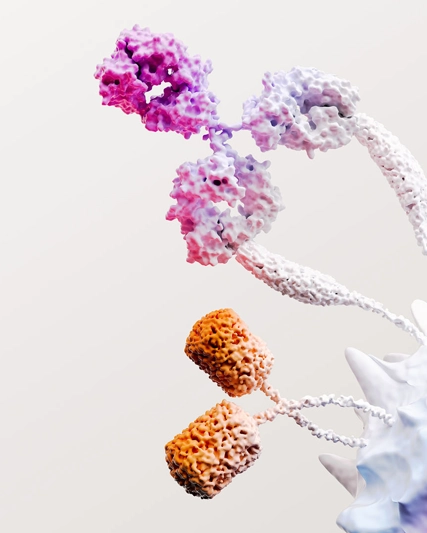Issued: London, UK
For media and investors only
GSK receives positive CHMP opinion recommending momelotinib for myelofibrosis patients with anaemia
- If approved, momelotinib will become the first and only treatment in the EU specifically indicated for myelofibrosis patients with moderate to severe anaemia
- Decision on EU marketing authorisation expected for momelotinib by early 2024
GSK plc (LSE/NYSE: GSK) today announced the Committee for Medicinal Products for Human Use (CHMP) of the European Medicines Agency (EMA) has adopted a positive opinion recommending approval of momelotinib for the treatment of disease-related splenomegaly (enlarged spleen) or symptoms in adult patients with moderate to severe anaemia who have primary myelofibrosis, post polycythaemia vera myelofibrosis or post essential thrombocythaemia myelofibrosis and who are Janus kinase (JAK) inhibitor naïve or have been treated with ruxolitinib.
The CHMP opinion is one of the final steps prior to a marketing authorisation decision by the European Commission. If approved, momelotinib would be the only medicine in the European Union (EU) specifically indicated for both newly diagnosed and previously treated myelofibrosis patients with moderate to severe anaemia that addresses splenomegaly and symptoms.
Nina Mojas, Senior Vice President, Oncology Global Product Strategy, GSK, said: “Momelotinib has a differentiated mechanism of action that may address the significant medical needs of myelofibrosis patients, especially those with moderate to severe anaemia. The vast majority of myelofibrosis patients will develop anaemia, causing them to require transfusions and leading a notable proportion to discontinue treatment. This positive CHMP opinion is a significant step in bringing momelotinib to patients in the EU with this difficult-to-treat blood cancer.”
The positive CHMP opinion is supported by data from the pivotal MOMENTUM study and a subpopulation of adult patients with moderate to severe anaemia (haemoglobin <10 g/dL) from the SIMPLIFY-1 phase III trial.1,2 MOMENTUM was designed to evaluate the safety and efficacy of momelotinib versus danazol for the treatment and reduction of key manifestations of myelofibrosis in an anaemic, symptomatic, JAK inhibitor-experienced population. SIMPLIFY-1 was designed to evaluate the efficacy and safety of momelotinib versus ruxolitinib in myelofibrosis patients who had not received a prior JAK-inhibitor therapy.
In these clinical trials, the most common adverse reactions were diarrhoea, thrombocytopaenia, nausea, headache, dizziness, fatigue, asthenia, abdominal pain and cough.1,2
If approved in the EU, momelotinib will be available under the proposed trade name Omjjara. This opinion follows the September 2023 approval of momelotinib under the brand name Ojjaara by the US Food and Drug Administration (FDA) for the treatment of intermediate or high-risk myelofibrosis, including primary myelofibrosis or secondary myelofibrosis (post-polycythaemia vera and post-essential thrombocythaemia), in adults with anaemia. Momelotinib is not approved in any other market.
About momelotinib
Momelotinib has a differentiated mechanism of action, with inhibitory ability along three key signalling pathways: Janus kinase (JAK) 1, JAK2, and activin A receptor, type I (ACVR1).1,3,4,5 Inhibition of JAK1 and JAK2 may improve constitutional symptoms and splenomegaly.1,3,5 Additionally, inhibition of ACVR1 leads to a decrease in circulating hepcidin levels, potentially contributing to anaemia benefit.1,3,4,5
About myelofibrosis
Myelofibrosis is a rare blood cancer that disrupts the body’s normal production of blood cells because of dysregulated JAK-signal transducer and activator of transcription protein signalling. The clinical hallmarks of myelofibrosis are splenomegaly (enlarged spleen), progressive anaemia and debilitating constitutional symptoms, such as fatigue, night sweats and bone pain, attributable to ineffective haematopoiesis and excessive production of proinflammatory cytokines.6
About 40% of patients have moderate to severe anaemia at the time of diagnosis and nearly all patients are estimated to develop anaemia over the course of the disease.7,8,9,10 Myelofibrosis patients with anaemia require additional supportive care, including transfusions, and more than 30% will discontinue treatment due to anaemia.11 Patients who are transfusion dependent have a poor prognosis and shortened survival.3, 12,13,14,15,16,17,18,19
About the pivotal clinical trials
MOMENTUM was a phase III, global, multicentre, randomised, double-blind study investigating momelotinib versus danazol in patients with myelofibrosis who were symptomatic and anaemic and had been previously treated with an approved JAK inhibitor. The trial was designed to evaluate the safety and efficacy of momelotinib for treating and reducing key hallmarks of the disease: symptoms, blood transfusions (due to anaemia) and splenomegaly. The MOMENTUM trial met all its primary and key secondary endpoints, demonstrating statistically significant response with respect to constitutional symptoms, splenic response and transfusion independence, in patients treated with momelotinib versus danazol.20 Results from the 24-week randomised treatment period were presented at the 2022 American Society of Clinical Oncology (ASCO) Annual Meeting and subsequently published in The Lancet,21,22 with 48-week data presented at the 64th American Society of Hematology (ASH) Annual Meeting and Exposition in December 2022 and subsequently published in The Lancet.23,24
SIMPLIFY-1 was a multicentre, randomised, double-blind, phase III study that compared the safety and efficacy of momelotinib to ruxolitinib in patients with myelofibrosis who had not received prior treatment with a JAK inhibitor. Safety and efficacy results for SIMPLIFY-1 were based upon a subset of patients with anaemia at baseline. The efficacy of momelotinib in the treatment of patients with myelofibrosis in SIMPLIFY-1 was based on spleen volume response (reduction of spleen volume by 35% or greater).
GSK in oncology
GSK is committed to maximising patient survival through transformational medicines, with a current focus on breakthroughs in immuno-oncology and tumour-cell targeting therapies, and development in haematologic malignancies, gynaecologic cancers and other solid tumours.
About GSK
GSK is a global biopharma company with a purpose to unite science, technology, and talent to get ahead of disease together. Find out more at gsk.com.
Cautionary statement regarding forward-looking statements
GSK cautions investors that any forward-looking statements or projections made by GSK, including those made in this announcement, are subject to risks and uncertainties that may cause actual results to differ materially from those projected. Such factors include, but are not limited to, those described under Item 3.D 'Risk factors” in the company's Annual Report on Form 20-F for 2022, and Q3 Results for 2023.
References
- [1] Verstovsek S, et al. MOMENTUM: momelotinib vs danazol in patients with myelofibrosis previously treated with JAKi who are symptomatic and anemic. Future Oncol. 2021;17(12):1449-1458.
- [2] Mesa RA, Kiladjian JJ, Catalano JV, et al. SIMPLIFY-1: A Phase III Randomized Trial of Momelotinib Versus Ruxolitinib in Janus Kinase Inhibitor-Naïve Patients With Myelofibrosis. J Clin Oncol. 2017;35(34):3844-3850.
- [3] Chifotides, HT, Bose, P, Verstovsek, S. Momelotinib: an emerging treatment for myelofibrosis patients with anemia. J Hematol Oncol. 2022;15(7):1-18.
- [4] Asshoff M, et al. Momelotinib inhibits ACVR1/ALK2, decreases hepcidin production, and ameliorates anemia of chronic disease in rodents. Blood. 2017;129(13):1823-1830.
- [5] Oh S, et al. ACVR1/JAK1/JAK2 inhibitor momelotinib reverses transfusion dependency and suppresses hepcidin in myelofibrosis phase 2 trial. Blood Adv. 2020;4(18):4282-4291.
- [6] Atallah E, Verstovsek S. Emerging drugs for myelofibrosis. Expert Opin Emerg Drugs. 2012 Dec;17(4):555-70. doi: 10.1517/14728214.2012.748748. PMID: 23186315; PMCID: PMC5009610.
- [7] Tefferi A, Lasho TL, Jimma T, et al. One thousand patients with primary myelofibrosis: the mayo clinic experience. Mayo Clin Proc. 2012;87(1):25-33. doi:10.1016/j.mayocp.2011.11.001
- [8] Bose P, et al. Curr Hematol Malign Rep. 2018;13:164-172. doi: https://doi.org/10.3109/10428194.2013.813500
- [9] Scherber, R.M., Mesa, R. Management of challenging myelofibrosis after JAK inhibitor failure and/or progression. Blood Rev. 2020;42:100716. https://doi.org/10.1016/j.blre.2020.100716
- [10] Bassiony S, Harrison CN, McLornan DP. Evaluating the Safety, Efficacy, and Therapeutic Potential of Momelotinib in the Treatment of Intermediate/High-Risk Myelofibrosis: Evidence to Date. Ther Clin Risk Manag. 2020;16:889-901. Published 2020 Sep 25. doi:10.2147/TCRM.S258704
- [11] Kuykendall AT, Shah S, Talati C, et al. Between a rux and a hard place: evaluating salvage treatment and outcomes in myelofibrosis after ruxolitinib discontinuation. Ann Hematol. 2018;97(3):435-441.
- [12] Tefferi A, et al. Use of the Functional Assessment of Cancer Therapy--anemia in persons with myeloproliferative neoplasm-associated myelofibrosis and anemia. Clin Ther. 2014;36(4):560-566. https://doi.org/10.1016/j.clinthera.2014.02.016
- [13] Tefferi A. Primary myelofibrosis: 2021 update on diagnosis, risk-stratification and management. Am J Hematol. 2021;96(1):145-162. https://doi.org/10.1002/ajh.26050
- [14] Rumi E, et al. The Genetic Basis of Primary Myelofibrosis and Its Clinical Relevance. Int J Mol Sci. 2020;21(23):8885. https://doi.org/10.3390/ijms21238885
- [15] How J, Hobbs GS. A Practical Guide for Using Myelofibrosis Prognostic Models in the Clinic. J Natl Compr Canc Netw. 2020;18(9):1271-1278. https://doi.org/10.6004/jnccn.2020.7557
- [16] QxMD. DIPSS prognosis in myelofibrosis. Accessed September 12, 2022. https://qxmd.com/calculate/calculator_187/dipss-prognosis-in-myelofibrosis.
- [17] QxMD. DIPSS plus score for prognosis of myelofibrosis. Accessed September 12, 2022.
- [18] Nicolosi M, et al. Sex and degree of severity influence the prognostic impact of anemia in primary myelofibrosis: analysis based on 1109 consecutive patients. Leukemia. 2018;32(5):1254-1258. https://doi.org/10.1038/s41375-018-0028-x
- [19] Elena C, et al. Red blood cell transfusion-dependency implies a poor survival in primary myelofibrosis irrespective of IPSS and DIPSS. Haematologica. 2011;96(1):167-170. https://doi.org/10.3324/haematol.2010.031831
- [20] Verstovsek S, et al. MOMENTUM: momelotinib vs danazol in patients with myelofibrosis previously treated with JAKi who are symptomatic and anemic. Future Oncol. 2021;17(12):1449-1458.
- [21] Mesa R, et al. Presented at: American Society of Clinical Oncology; June 2022. Abstract 7002.
- [22] Verstovsek S, et al. Momelotinib versus danazol in symptomatic patients with anaemia and myelofibrosis (MOMENTUM): results from an international, double-blind, randomised, controlled, phase 3 study. The Lancet. 2023;401(10373):269-280.
- [23] Gerds AT, et al. Presented at: American Society of Hematology; December 2022. Abstract 627.
- [24] Gerds AT, et al. Momelotinib versus danazol in symptomatic patients with anaemia and myelofibrosis previously treated with a JAK inhibitor (MOMENTUM): an updated analysis of an international, double-blind, randomised phase 3 study. The Lancet Haematology. 2023;10(9):E735-E746. https://doi.org/10.1016/S2352-3026(23)00174-6


